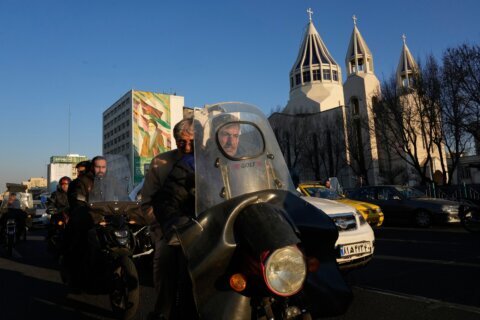The leaders of 32 NATO member countries were greeted in Washington on Tuesday by blazing hot sunshine, sweltering temperatures and the turmoil of political uncertainty as they kicked off the 75th anniversary and summit of the alliance.
By the time they prepared to depart, the U.S. political troubles, which directly impacts NATO’s future, had deepened; and separate internal concerns lingered.
The summit was laced together with a mix of celebrations to commemorate NATO’s history and anxiety about its future.
At the opening of the three-day gathering, President Joe Biden, the host of the historic event, was battling growing demands from his own party to bow out of the upcoming presidential election.
European political and intelligence sources told WTOP that those calls rattled many of the dignitaries, who were already worried after Mr. Biden’s performance in a presidential debate on June 24 with Donald Trump.
The newly-elected Biden guaranteed in 2020 that the U.S. was firmly back at NATO’s side and would remain there after a tumultuous four years during Trump’s presidency. But, looking at the current political landscape, he’s no longer able to back that guarantee.
‘It’s necessary for our own interest to defend Ukraine’
In addition to American political dysfunction, NATO grappled during the summit with its own internal problems.
Topping that list are businesses in NATO member countries that may be helping Moscow pursue its war against Ukraine.
The day before the summit began, Russia’s military attacked a children’s hospital in Ukraine, reportedly using weapons built with Western components — something a broad Russia sanctions package was designed to prevent.
Estonia’s Prime Minister Kaja Kallas, during the “Strengthening the trans-Atlantic Bond” panel discussion, criticized Western companies that, allegedly, knowingly provide weapons components to Moscow.
“When I go to different European countries that are further away from the war and don’t see Russia — maybe the way that we do — I see this will still profit from it,” she said.
She suggested that leaders in these companies believe the war is not their problem and have dealt with the conflict in a disingenuous way. Kallas said they tell themselves and others, “It doesn’t really concern me. I just want to do my trade.”
“We see the circumvention of sanctions, but these are the same companies that are complaining that ‘our businesses are hurt, our economies are hurt because of it (the sanctions),'” she said.
One potential reason for the look-the-other-way mentality, according to Western intelligence sources, is animosity toward Ukraine.
The President of the Czech Republic Petr Pavel addressed it briefly during the same panel discussion Kallas participated in.
“It doesn’t matter if we take it as a matter of liking or disliking Ukraine. It’s about if we like to live in a world where rules matter or not, and this is what is it all about,” said Pavel.
He said nations should support Ukraine because they would want the same if they were in a similar situation: “We want to live in a world where smaller countries are also protected; where they have the guarantees to live up to their aspirations, and that’s why we believe it’s necessary for our own interest to defend Ukraine.”
He also chided NATO member countries for being too slow to help Ukraine.
“From the beginning, there were some delays and gaps that cost Ukraine a lot of lives and some territory, and also some self-confidence when it comes to achieving their own goals,” Pavel said.
Despite the prominent airing of internal shortcomings, the central focus of the summit was, as expected, Ukraine; and making sure the embattled country gets all it needs to fight Russia.
‘We have changed when the world is changing’
Even so, trans-Atlantic relations expert Eeva Eek-Pajuste, who has served in several diplomatic positions around the world for Estonia’s Ministry of Foreign Affairs, noted that while the summit was an extremely important moment for Ukrainian President Volodymyr Zelenskyy, he didn’t get everything he wanted.
“He pleaded for and explained the importance of lifting the restrictions of using Western-allied arms for strikes in not only border areas around Russia, but on the whole territory of Russia. And also, his staff explained at the summit, how critical this permission was, but this allowance was not given to them,” Eek-Pajuste said.
NATO Secretary-General Jens Stoltenberg sought to soothe the anxiety about the alliance’s problems and Ukraine’s challenges by reminding summit attendees that the organization’s longevity is proof that it can overcome tests like those it faces today.
“The only way to truly celebrate that achievement — the 75th anniversary — is, of course, to demonstrate that NATO is adapting, that we are changing when the world is changing. We are the most successful alliance in history because we have changed when the world is changing. And now, we live in a more dangerous, more challenging security environment. And therefore, NATO is changing again,” Stoltenberg said.
But even as NATO rises to meet those changes and challenges, one of the most concerning developments is the resurgence of far-right politics in Europe. Their views are often reminiscent of the ideologies that underpinned Nazi Germany’s efforts to absorb all of Europe during World War II.
According to Steven Erlanger, chief diplomatic correspondent for the New York Times, diversity of thought among the far right in Europe is a complicating matter.
“The far right is different in every country. I mean, the German far right isn’t the French far right. It’s not the Swedish far right. And, Europe operates with coalition government, so it’s very difficult for one party to swing weight in quite the same way,” Erlanger said.
Erlanger said in an interview with WTOP that the power resides with control of the budgets in these countries. And considering there is significant support for Russia in some of these countries, it could impact how, or if, they support Ukraine.
“Everyone talks about being with Ukraine as long as it takes, but they really don’t define what it is, or what victory is,” he said.
“The Germans, for example, say it’s important Russia doesn’t win; and Ukraine doesn’t lose, which, in a way, is a formula for stalemate. I mean, they’re looking for a negotiation,” he added.
Despite the public proclamations at the summit of unified support for Ukraine, there is still a lively debate behind the scenes about how far to go. Some say, “No matter how long it takes.” Others say, “whatever it takes.”
But Denmark’s President Mette Frederiksen, who participated in the “Strengthening the trans-Atlantic Bond” panel discussion as well, suggested that regardless of how one describes their support for Ukraine, the most important thing is: to just do it.
“It’s not a difficult decision. You have to do what is the right thing to do, and doing the right thing is never difficult,” said Frederiksen.
Get breaking news and daily headlines delivered to your email inbox by signing up here.
© 2024 WTOP. All Rights Reserved. This website is not intended for users located within the European Economic Area.






